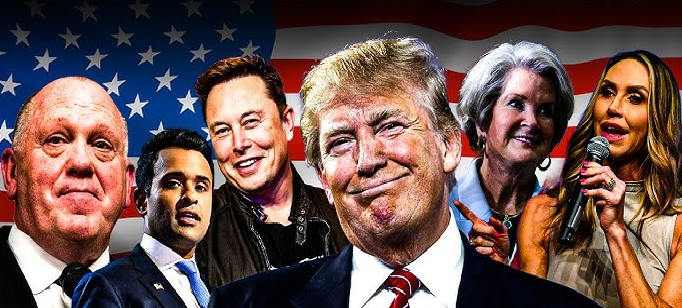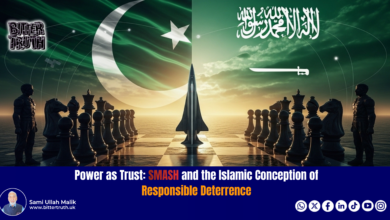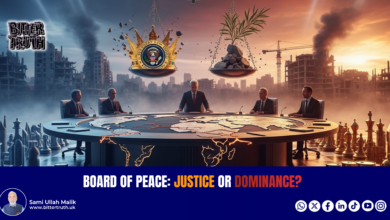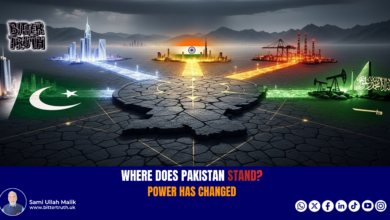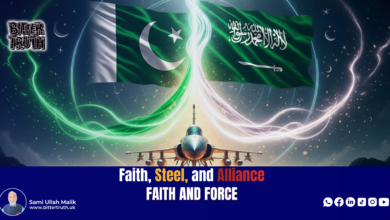Power Players in Trump’s Administration: A Look at Key Nominees
The Future of US-Global Relations Under Trump's New Administration
Donald Trump will take the oath of office as the 47th President of the United States on 20th January. However, even before his inauguration, Trump has already announced key appointments for his second term. These appointments are being closely observed worldwide, as analysts try to discern the stance and history of each individual on critical issues. So far, his choices range from Elon Musk, the owner of X, to Trump’s close allies and friends. Experts are attempting to gauge Trump’s potential policies, especially regarding the Middle East, and whether he will continue to support Israel.
From the appointments so far, it appears Trump is rewarding his loyal supporters. For instance, Steve Witkoff, a long-time donor to Trump’s campaigns and his golfing partner, has been appointed Special Envoy to the Middle East. On the other hand, Mike Huckabee, nominated as the U.S. ambassador to Israel, is well-known for his pro-Israel stance and business acumen. Although Witkoff has no direct connection to the Middle East, his nomination, along with Huckabee’s, and the choice of the U.S. Ambassador to the United Nations, clearly indicates that Trump plans to offer unequivocal support to Israel.
Trump has also nominated retired Army Colonel Mike Waltz as National Security Advisor. Waltz has previously referred to China as the greatest economic and military threat to American influence, describing the situation as akin to a new Cold War. Similarly, Elise Stefanik, nominated as the U.S. Ambassador to the United Nations, has accused China of meddling in elections, citing allegations that Chinese-backed hackers attempted to extract information from former U.S. presidents’ phones. While Trump has generally limited his criticism of China to trade issues, his foreign policy team is increasingly composed of outspoken critics of the country.
For the pivotal position of Secretary of State, Trump has nominated Senator Marco Rubio, who was once one of his political adversaries but is considered an expert in foreign policy. Announcing Rubio’s nomination, Trump described him as a “strong voice for liberty” and a “powerful advocate” for the U.S. Rubio, who comes from a family of Cuban immigrants, would become the first Latino Secretary of State if confirmed. Rubio has also been a vocal critic of China, which is one of Pakistan’s closest allies.
In September this year, Rubio wrote in The Washington Post that China is “America’s greatest and most advanced adversary. Communist China is neither a friend of democratic nations now nor will it ever be.” In 2020, the Chinese government-imposed sanctions on Rubio after he led efforts to impose U.S. sanctions in response to Beijing’s crackdown on protests in Hong Kong. He is also known for his tough stances on Iran and China.
In July, Rubio made headlines when he introduced a bill in the U.S. Senate supporting India and opposing Pakistan. Titled the U.S.-India Defense Cooperation Act, the bill aimed to deepen defence partnerships between the two nations to counter “China’s growing aggression” in the Indo-Pacific region. It proposed providing India with security assistance and strengthening cooperation in defence, civil space, technology, and economic investments. The bill suggested extending to India the same approach regarding “technology transfers” as applied to U.S. allies like Japan, Israel, South Korea, and NATO countries.
Regarding Pakistan, the bill recommended that Congress receive a report on Pakistan’s alleged use of terrorism and proxy groups against India. It further stated that if Pakistan were found sponsoring terrorism against India, it should be denied security assistance. Rubio has also taken a hardline stance against Iran, referring to it as a “terrorist” state, and he supports strong action against Israel’s neighbour.
Following recent Iranian attacks on Israel, Rubio supported Israel’s retaliatory actions against Hamas, stating on social media: “Israel should respond to Iran the same way the U.S. would if a country launched 180 missiles at us. I want them [Israel] to destroy every element of Hamas. These [Hamas members] are animals who have committed horrific crimes.”
Marco Rubio: A Key Appointment in Trump’s Team
Marco Rubio, a senior member of the Senate Foreign Relations and Intelligence Committees, has evolved from being one of Trump’s harshest political rivals and critics to now being considered one of his close allies. Serving as the Vice Chairman of the Senate Intelligence Committee and a member of the Foreign Relations Committee, Rubio is widely regarded as a shrewd foreign policy expert. In the past, he has stated that the ongoing conflict between Russia and Ukraine needs to be “brought to a conclusion.” Accepting his nomination for the position of Secretary of State, Rubio described it as a “weighty responsibility” and stated, “As Secretary of State, I will work daily to advance President Trump’s foreign policy agenda. Under his leadership, we will establish peace through strength and always prioritise Americans and the interests of the United States above all else.”
In this analysis, we will examine the key appointments made by Trump to understand the backgrounds and political ideologies of the individuals joining his team. Analysts, taking these decisions into account, are attempting to predict the Republican president’s policies for South Asia, the Middle East, and specifically Pakistan. Many of the appointees have previously made headlines for their views on South Asia—particularly Pakistan and India—as well as the Middle East. However, it remains challenging to definitively ascertain their policy directions prior to the inauguration.
Mike Waltz
Mike Waltz, a Congressman from Florida, has extensive military experience, having served in Afghanistan, the Middle East, and Africa. Last year, in an interview with the Indian news channel WION, he remarked on Pakistan: “Terrorism cannot be part of foreign policy. Be it Lashkar-e-Taiba or other terrorist groups, this is unacceptable. The Pakistani government, military, and intelligence must move beyond this, and we will continue to press them to take the right direction.” In an interview with Florida Politics earlier this year, he praised Trump, stating: “We had a president who defeated ISIS, broke Iran, always stood with Israel and other allies, and made China pay for its actions. You never saw spy balloons over America during President Trump’s time.”
Tulsi Gabbard
Tulsi Gabbard, a former Congresswoman and Lieutenant Colonel in the U.S. military, has been nominated by the newly elected president to serve as Director of National Intelligence. Gabbard has also previously criticised Pakistan. In 2017, she accused Pakistan of providing refuge to Osama bin Laden and criticised the release of Jamaat-ud-Dawa chief Hafiz Saeed, calling him the “mastermind” behind the Mumbai attacks, which resulted in the deaths of hundreds, including six Americans. In March 2019, commenting on U.S.-Pakistan relations, she posted on social media: “As long as Pakistan provides safe havens for terrorists, tensions between the two countries will remain. It’s time for Pakistani leaders to take a stand against extremists and terrorists.”
John Ratcliffe
John Ratcliffe, who served as Director of National Intelligence during Trump’s first term, has been re-nominated to lead the Central Intelligence Agency (CIA). He was initially nominated in 2019 shortly after gaining attention for high-profile questioning of Special Counsel Robert Mueller during congressional hearings. Mueller, the former FBI Director, had led investigations into allegations of collusion between Russia and Trump’s 2016 election campaign. Ratcliffe’s nomination was withdrawn after bipartisan concerns regarding his qualifications. However, Trump re-nominated him in 2020, stating, “The press treated him very unfairly.”
Ratcliffe is known for his hardline stance on China and Iran. In December 2020, he wrote in The Wall Street Journal: “The intelligence is clear: Beijing seeks dominance over the U.S. and the world in the economic, military, and technological spheres. China’s major corporations work under the guise of business but serve the Communist government’s interests.”
Broader Implications
Political analysts closely observing U.S. politics and policymakers believe it is difficult to predict Trump’s exact policies before his inauguration. However, many agree that Pakistan is unlikely to be a priority for the new president. Reviewing the statements of Trump’s appointees suggests that his administration will operate in line with its ideological beliefs. That said, ideology alone rarely dictates policymaking. Instead, policymaking involves navigating complex challenges and crafting strategies to address them effectively.
There is no doubt that these individuals hold strong stances on a variety of issues, yet they often demonstrate a pragmatic approach when necessary, without fear of appearing weak. Ultimately, they will operate under the directives of the president, who is not an ideologue but a dealmaker and an opponent of prolonged wars.
As far as Pakistan is concerned, existing policies are likely to remain unchanged unless significant crises emerge, or relations deteriorate. Pakistan is expected to remain a low priority for the Trump administration unless it actively positions itself as a valuable ally. However, its strategic relationship with China will continue to be a challenge in any scenario.
Challenges for the New Administration
The incoming American administration faces a host of pressing challenges. Pakistan, especially its internal politics and relationship with India, will rank low on their agenda. The Trump administration’s primary focus will likely remain on the Middle East, particularly Iran. Analysts predict that Trump’s Middle East policy will revolve around exerting “maximum pressure” on Iran while attempting to revive the Abraham Accords and fostering Saudi Arabia’s recognition of Israel. Achieving this, however, may be difficult given the volatile situation in Palestine. Notably, in a recent speech at the Islamic Conference in Riyadh, the Saudi Crown Prince emphasised Israel’s need to cease hostilities immediately while reiterating Saudi cooperation in the event of an attack on Iran.
Pakistan’s Diminished Importance
Pakistan’s importance in the eyes of the US has diminished after the withdrawal of troops from Afghanistan. Pakistan is not yet on Washington’s radar. Amid the strategic relationship between Pakistan and China and the partnership between India and the US, Pakistan will have to find some space and improve relations with the US. If anti-China figures in the Trump team view Pakistan through the lens of China or India, the scope for meaningful bilateral relations between the US and Pakistan will further shrink. Other analysts also estimate that the new administration’s policy may not bring any pleasant changes for Pakistan.
US policymakers believe that the policy of ignoring Pakistan and not giving Islamabad access to the chambers of power in Washington is suitable to put Pakistan in a difficult position, but Pakistan has a better chance than Iran and China to improve relations with the Trump administration by making some efforts.
Key Appointments and Middle East Focus
Mike Huckabee has been nominated as the US ambassador to Israel. Though not Jewish, Huckabee has long been an outspoken supporter of Israel. In 2008, he famously stated, “There is no such thing as Palestine.” His nomination was celebrated by Israeli National Security Minister Itamar Ben-Gvir, who shared the news on social media with flags and heart emojis. Huckabee first visited Israel in 1973 and has since led numerous Christian missions there. During a 2018 visit, he laid the cornerstone for a new housing complex in the West Bank and expressed interest in purchasing a home there.
In a more recent nomination, Donald Trump named Steve Witkoff, a real estate mogul and campaign donor, as his special envoy for the Middle East. Trump praised Witkoff as a tireless advocate for peace and a close friend, noting their decades-long friendship that began in 1986 after a business transaction. Witkoff famously testified in Trump’s defence during the Manhattan fraud case and has been a long-time golf partner of the former president.
Pete Hegseth, a former US Army officer and Fox News host, has been nominated as Secretary of Defense. Hegseth has also served as the leader of two veterans’ advocacy groups and ran unsuccessfully for a Senate seat in Minnesota. Announcing his nomination, Trump wrote, “Pete is tough, smart, and truly believes in putting America first. Under his leadership, our military will once again become the best, and America will never fall. Pete fights for our troops like no one else, and he is a brave, patriotic champion of our ‘peace through strength’ policy.”
Conclusion
Experts believe that while the Trump administration will operate within a framework of ideological preferences, actual policymaking will remain pragmatic, driven by the need to address complex challenges. For Pakistan, navigating its relationship with the US under the new administration will require careful diplomacy, particularly given its close ties with China and the shifting dynamics in the Middle East.
Mike Waltz, a 50-year-old member of Congress from Florida, has previously served in the US military and has visited Afghanistan, the Middle East, and Africa several times. He has been nominated as the new National Security Advisor in Donald Trump’s second presidential term. He has long been a supporter of Trump. In a message on X, he wrote that he felt “deeply honoured” to serve in Trump’s cabinet. “There is nothing more important than defending the values of our nation, freedom, and the safety of every American.”
As the Chairman of the Armed Services Subcommittee, Mike Waltz holds a tough stance on China and stresses that the US needs to take more action regarding conflicts in the Pacific. He has also stated that the US should continue its support for Ukraine, although he has recently advocated for a review of the American expenditures in the ongoing war.
Trump’s major backers and financiers, Elon Musk and former Republican presidential candidate Vivek Ramaswamy, have also been assigned leadership roles in new government departments. Notably, Elon Musk, one of Trump’s most significant supporters and one of the wealthiest people in the world, donated $119 million to Trump’s election campaign. Trump stated in a statement, “These two outstanding Americans will work together to eliminate the bureaucratic system, reduce unnecessary regulations, cut wasteful spending, and reorganise federal agencies, which is essential for the ‘Save America’ movement.”
Responding to this responsibility in the Trump administration, Elon Musk, the CEO of Tesla, wrote, “This will shake up the system.” On the other hand, Vivek Ramaswamy also stated that he would “not allow any leniency.” Similarly, Trump confirmed that he would appoint South Dakota Governor Kristi Noem to head the Department of Homeland Security. Noem’s name had been floated as a potential Vice-Presidential candidate during the summer. She has long been an ally of Trump and ran a vigorous campaign for the elected president. She was also in the media spotlight earlier this year when she revealed that she had shot her dog because it was “untrained” and “dangerous.”
These nominations suggest that Trump is rewarding his supporters and, moreover, taking a very hard stance towards China and Iran while openly supporting Israel, which casts doubt on his election promise to end wars.

